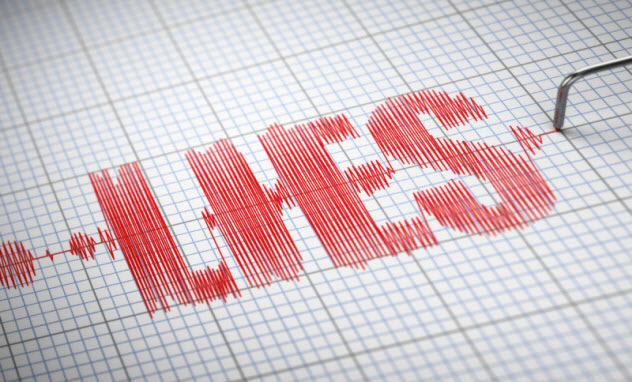 Weird Stuff
Weird Stuff  Weird Stuff
Weird Stuff  Animals
Animals 10 Inspiring Tales of Horses Being Human
 Mysteries
Mysteries Top 10 Haunting Facts About the Ghost Ship MV Alta
 History
History 10 Surprising Stories About the Texas Rangers
 Humans
Humans 10 Philosophers Who Were Driven Mad by Their Own Theories
 Miscellaneous
Miscellaneous 10 Video-Game-Worthy Weapons and Armors from History
 Weird Stuff
Weird Stuff 10 Psychics Who Accurately Predicted Wartime Events
 The Arts
The Arts 10 Pieces of Art Inspired by a Broken Heart
 Health
Health 10 Science Fiction-Sounding New Medical Treatments
 History
History 10 Surprising Facts About the Father of Submarine Warfare
 Weird Stuff
Weird Stuff 10 Times Real Laws Were Based on Bizarre Hypotheticals
 Animals
Animals 10 Inspiring Tales of Horses Being Human
 Mysteries
Mysteries Top 10 Haunting Facts About the Ghost Ship MV Alta
Who's Behind Listverse?

Jamie Frater
Head Editor
Jamie founded Listverse due to an insatiable desire to share fascinating, obscure, and bizarre facts. He has been a guest speaker on numerous national radio and television stations and is a five time published author.
More About Us History
History 10 Surprising Stories About the Texas Rangers
 Humans
Humans 10 Philosophers Who Were Driven Mad by Their Own Theories
 Miscellaneous
Miscellaneous 10 Video-Game-Worthy Weapons and Armors from History
 Weird Stuff
Weird Stuff 10 Psychics Who Accurately Predicted Wartime Events
 The Arts
The Arts 10 Pieces of Art Inspired by a Broken Heart
 Health
Health 10 Science Fiction-Sounding New Medical Treatments
 History
History 10 Surprising Facts About the Father of Submarine Warfare
10 Fun Things You Should Know About Accents
If you walk into a bar or pub that’s not in your hometown, the chances are good that someone’s going to ask where you live as soon as you start to talk. Our accents define us, identify us with a certain region, and sometimes even stereotype us.
10 Sign Language Has An Accent

Some places—like Buffalo and Boston—have such strong regional accents that it’s clear when you’re talking to someone from those cities. But you don’t have to speak to have an accent. They crop up in American Sign Language, too.
Philadelphia has one of those instantly recognizable accents, to the point where its “Iggles” football team and other odd pronunciations were explained in an entire article in The Washington Post. However, that accent also appears in Philly’s version of American Sign Language.
Researchers at the University of Pennsylvania have started studying the “accent” of the deaf community in Philadelphia. So far, they’ve discovered that certain words, such as “hospital,” have morphed into something completely different in Philadelphia than in other areas. The shapes made, the positioning of the hands, and the basic foundation of communication are also unique.
The researchers believe that such profound differences should be preserved. They’re embarking on a long-term project to interview native Philadelphians and completely document their version of sign language. The researchers are also exploring the possibility that the community has its own sentence structure.
As late as 1984, deaf children in Philadelphia were educated at boarding schools, which is why the unique accent may still show up there.
9 ‘Ax’ Has A Surprisingly Long History

If you hear anyone say “ax” instead of “ask,” you may automatically ascribe distinct ethnic, educational, and cultural traits to the person speaking. It’s one of those pronunciations and accents that goes beyond regional differences.
When Dr. Richard R. Green became one of the heads of New York City’s schools in 1988, he declared war on “ax,” dubbed it one of his “speech demons.” He wanted it gone. Oddly, it’s a pronunciation that’s centuries old and has plenty of distinguished proponents.
According to Jesse Sheidlower, president of the American Dialect Society, that pronunciation goes back to around the eighth century. The original word in Old English is “acsain.” Deriving “ax” from that is actually the logical thing to do. People have been doing it for centuries, including literary giant Geoffrey Chaucer. The spelling “axe” even made it into one of the earliest English versions of the Bible.
Although it might be more technically proper to pronounce it as “ax,” that doesn’t mean the pronunciation is part of mainstream English. While other early English accents disappeared like the dodo, this pronunciation hung on in the Caribbean and America’s Deep South.
That makes it a touchy subject. On one hand, it’s simply the way some families have talked for hundreds of years. But on the other hand, the popular pronunciation has become entirely different, making “ax” an odd regional accent that many people go out of their way to avoid.
8 Your Accent Might Make You Untrustworthy

University of Chicago researchers Boaz Keysar and Shiri Lev-Ari have taken a serious look at how we judge people’s worth by their accents. According to their findings, we view people with different accents from ours as untrustworthy liars.
First, they took a series of 45 trivia-laden statements and had them recorded in three different ways: in a native accent, in a mild accent (Polish, Turkish, and Austrian-German), and in a heavy accent (Italian, Korean, and Turkish). Then volunteers listened to the statements and rated their believability. The volunteers thought they were participating in a knowledge assessment. The results were incredibly telling, with statements read in a native accent deemed much more truthful than those read in a heavy foreign accent.
In a follow-up experiment, volunteers were told that they were a part of a study to determine if difficulty in understanding a speaker made a difference in how likely it was that the speaker would be believed. Once again, native speakers and those with only a mild accent were ranked as much more believable than those with a heavy accent.
According to the researchers, the reason probably has to do with cognitive fluency. When a person’s speech is hard to understand and their accent is unfamiliar, our brains work harder to process the information. Our brains don’t like to work hard, so we doubt the truthfulness of what we’re told.
For the same reason, rhyming words and phrases are easier to remember, and companies with shorter names tend to be more successful. The researchers suggested that our view of accented speakers as more untrustworthy probably has less to do with our prejudices and more to do with our lazy brains.
7 The Deadly Biblical Accent

The habit of judging the trustworthiness of people by their accents also shows up in the Bible. In Judges, Chapter 12, the men of Gilead took possession of a series of fords in Jordan after defeating the Ammonites. The men of Ephraim, who didn’t help the men of Gilead when they were called, quickly became enemies of Gilead as well.
When the men of Ephraim tried to flee across the fords, they were asked to pronounce the word “shibboleth” to determine whose side they were on. Their accents made the word come out as “sibboleth,” so they were quickly branded as enemies, seized, and killed. According to the chapter, 42,000 Ephraimites died.
It has been difficult to translate the story into languages that don’t distinguish between the “s” and the “sh” sounds, which is the problem that meant death for the Ephraimities. We’re not even sure what the original word was, as it can mean an “ear of grain” or a “flowing stream.”
6 The News Anchor Accent

If you tune in to a local news channel anywhere in the US, you’ll hear the latest headlines read in exactly the same accent. It’s a bland accent that eliminates regional intonations. It also has some vaguely annoying characteristics, such as cliff-hangers tacked on to words, exaggerated slow speech, and clearly defined pronunciation.
Learning how to speak this way is a part of most broadcasting classes. At Philadelphia’s Temple University, these classes cover everything from enunciating every part of the word—especially the “-ing” endings that are often truncated—to eliminating regional accents, phrases, and speech patterns.
But the news anchor accent may be fading into history. For example, the “big announcer” voice and accent that once dominated the radio is now mostly gone, pushed aside in favor of a more guy-next-door type of speech.
The news anchor accent isn’t going without a fight, though. It’s become so widely accepted—and expected—that it’s incredibly noticeable when anyone deviates from it and can even generate hateful responses from listeners. When Phoenix NBC anchor Vanessa Ruiz, a bilingual newscaster who’s lived in South America and Europe as well as the US, pronounced certain words with a more authentic accent, viewers became so incensed that she issued an impressively calm and surprisingly curse-free rebuttal on air.
5 We Have An Accent Before We Can Speak

It’s logical that the accent we hear the most when we’re younger is the one with which we speak. But research from Wurzburg University in Germany suggests that we develop and speak with our accent long before we utter our first words.
The researchers found that the crying of newborn babies contained melodies that mimicked the speech patterns and accents of their parents. For example, French babies were more likely to raise the pitch of their cries toward the end, mimicking the cadence of a French speaker’s accent. German babies did the exact opposite, just like their language does.
These accents show up in babies as young as three days old. The researchers believe that it might be an attempt to form a bond with their mother by imitating her sounds as well as they can at that age. Although we’ve known for a while that babies can hear in the womb, this study suggests that they interact with those sounds, too.
As a result, crying may provide the most fundamental groundwork for language, communication, and a baby’s later accent.
4 We’re Largely Stuck With Our Accents

If we’re learning our accents before we actually talk, it makes sense that we tend to stick with the accent we first develop. Although bits and pieces of another accent or language might sneak in if you move somewhere else, it’s unlikely that you’ll ever pass for a native speaker in another region.
Few differences are more pronounced than the “r” and “l” sounds between native English speakers and English-speaking Japanese. After studying the first six months of babbling from both English and Japanese babies, researchers at the University of Washington found that Japanese babies stopped forming the “r” and “l” sounds at about 10 months old.
According to UC San Diego linguists, we spend so much time as children learning how to communicate with our friends, family, and neighbors that we don’t have time to worry about much else. By the time we’ve mastered this communication pattern and accent, we’re approaching puberty and likely haven’t been practicing with any other accent.
Our brains have also been conditioned with those patterns. That’s why a lot of foreign actors trying to speak with an American accent sound like John Wayne and why Americans immediately notice it, no matter what their own regional accent is. But that’s where our brain’s input largely stops.
Our brains start to block out all the nuances, shapes, and sounds we need to speak with another accent. It’s all discarded as useless information, which means we have to make a conscious effort to learn another accent. Each individual sound needs to be identified and practiced, which takes a lot of work.
In a “head-turn” study from the University of Washington, babies of various ages repeatedly listened to “la la la la la.” When the “la” became a “ra,” the babies were conditioned to believe that something was going to happen behind them and they should turn and look.
For Japanese and American babies, 67 percent turned to look at the sound cues when they were six months old. By the time the American babies were one year old, 80 percent looked. But only about 59 percent of the Japanese babies heard the different sounds, suggesting that we not only have difficulty pronouncing foreign words but consciously hearing them as well.
3 Singing And Accents

Although prolonged speaking in a believable foreign accent is rare, singing in another accent is quite common. The British Invasion provides one of the best examples. Listen to the Beatles sing, and there’s no trace of the Liverpool accent that’s unbelievably strong when they talk.
A number of studies have concluded that many foreign singers end up sounding American when they sing simply because they choose to. After all, rock and roll has traditionally been perceived as an American phenomenon, so singing with an American accent seems like a good way to break into the US market. However, some groups like the Proclaimers retain their accent when they sing, so we know the change to an American accent doesn’t happen all the time.
When researchers from the University of Auckland looked at the construction of words that were sung, they discovered a strange shift in how a person naturally pronounces words based on whether the person is singing or speaking. The researchers found that it’s easier to sing rock and roll or pop lyrics in an American accent because of the rhythm and slower pace of the words.
But the “pop music accent” is not nearly as widespread with other types of music, such as country. In those cases, singers channel different accents depending on the type of music, with a twang more likely for country and a Jamaican accent for reggae.
2 Foreign Accent Syndrome
As hard as it is for us to imitate an accent that’s different than our own, there is a weird way that it can happen literally overnight. It’s called foreign accent syndrome (FAS).
When British citizen Sarah Colwill was rushed to the hospital for an intense migraine, she woke up speaking with a Chinese accent. Similarly, Kay Russell found that her accent had changed from British to French after her migraine. There’s no known cause for FAS, although most of the 150 documented cases have occurred after a stroke or other head injury. In the case of the women suffering from migraines, it’s believed that the episodes were so severe that they may have caused brain damage.
After a car accident, British citizen Julie Matthias found that she was speaking only with a Chinese or French accent. She retained her ability to speak English, but that’s not always the case. Colwill has suffered from a major loss of vocabulary as well. Even more disturbing, she feels intense physical pain when she tries to write in her native English.
In some cases, a person’s language is completely replaced. For example, in 2012, Alun Morgan was left speaking fluent Welsh after a stroke.
According to research done by some of the few universities studying the condition, the shifted accent usually isn’t a perfect replacement. For people whose accents mysteriously change, they stress their words differently and more frequently than native speakers.
But finding an actual cause is often difficult. For one patient whose Italian accent occasionally changed to a South American or English one, doctors discovered that her condition was caused by a brain tumor that was interfering with signals in her brain. Once her operation to remove the tumor was complete, her foreign accent disappeared.
Those who suffer from FAS often suffer from depression as well, stemming in part from the feeling that they no longer recognize this fundamental aspect of themselves and that they’re treated differently by people.
1 Chimpanzees And Goats Have Accents

When a group of Dutch chimpanzees moved in with a group of Scottish ones, it was an unprecedented chance to see how their vocalizations changed as the two groups became closer. Zoo staff found that the chimps were changing their accents.
The two groups were integrated at the Edinburgh Zoo, and staff started focusing on the grunt that the chimps used to signify apples. The Scottish chimps communicated with a much lower tone than the Dutch ones. Over about three years, the chimps adjusted their calls to be more similar to each other.
According to researchers from the Universities of Zurich and York, if chimps can adjust their regional dialects and accents based on new social groups, it’s likely that our earliest ancestors had the same ability. However, critics of this study say that these conclusions don’t match the recorded data.
At the heart of the debate is whether the chimps were changing the words they used to describe apples or the way in which they said those words. No one is sure whether the animals were just trying to fit in or actually learning new words.
On the side of a changing accent is documentation that other animals seem to change their accents to fit in with a new social group. According to Queen Mary University’s study on goat vocalization, young goats introduced into other groups will change their calls to be more like their new peers. These early stages of vocal learning may mirror the same processes that early humans experienced, suggesting that animal communication is more complex than we originally believed.








